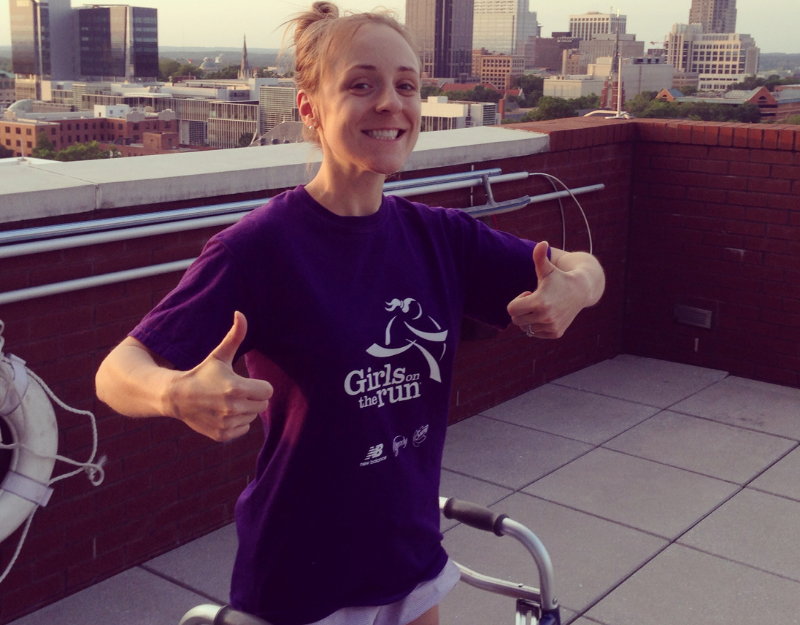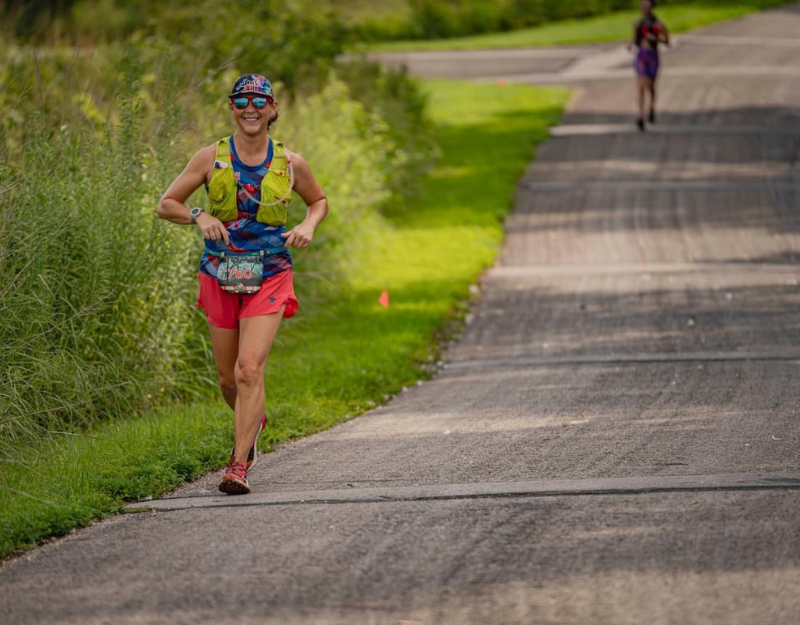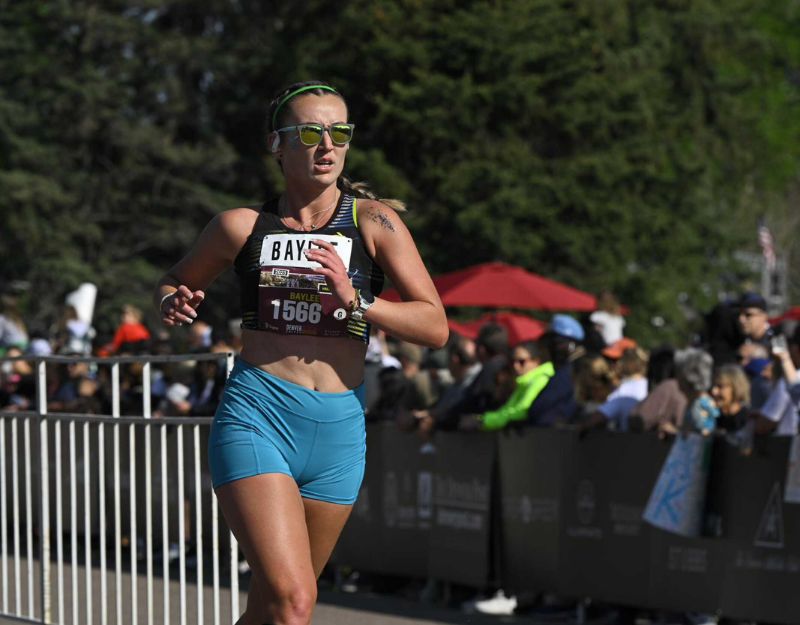For runners, an injury or disappointing race result can feel extremely discouraging after working hard towards a goal. This month, we asked our RADrabbits about how they navigate these challenges - we heard about their methods and self-talk tactics used to work through the disappointment. Read Tracie, Suzanne, and Baylee's responses below:

Tracie
I have been a runner for over 20 years and for the first 14 years of pounding the pavement, my running journey was disrupted by injuries. Constantly. It was impossible to put together a consistent year of training because something was always swollen, aching, or in a boot. Once I remember crying on the living room floor, while my husband looked on with complete bewilderment. Why can’t I just run? I sobbed into a pillow.
They say the Universe sends you subtle messages all of the time and if you choose not to listen, a harsher message awaits. In 2014, after years of subtle warnings, I heard my message loud and clear. After dropping out of the 2014 Boston Marathon with a severe hip pain, I was diagnosed with an 8mm displaced fracture that required immediate surgery. One titanium rod and two screws later, I was told running was off the table for at least a year. Never have I felt so defeated and so determined at the same time.
Injuries happen. But knowing that never makes it any less difficult. When I came home from the hospital two days after my surgery and on my 31st birthday, I was at a loss. I was in so much pain and the thing that had always brought me peace was no longer an option for the foreseeable future. After adjusting to my new, albeit temporary, normal, I made a plan for how I would navigate the following year. These are the words from my journal entry on May 2, 2014, the day my healing journey began:
- Control the controllable - No, I can’t run. But in time, I can swim. I can bike. And I can strength train. Let go of what isn’t in your control and take ownership of what is.
- Surround yourself with friends and family. They love you and they can help you through this. You are not in this alone.
- Remember this is a journey. There is no end destination and this is a valley before the next peak. It was never going to be a straight line to the top. Life is like a sine wave. Sometimes it's up and sometimes it's down. Just keep riding the wave.
- Read. And write. Read books that inspire you. Books that heal. Then write about it. Write to process your emotions. It’s okay to be angry or sad. But don’t keep it in. The moment you get the feelings out is the moment they have less control over you.
- There is a lesson in this. Learn from it.
Sometimes injuries take us out for a week. Or a month. Or even longer. But as long as we keep moving forward, we are headed in the right direction. Being sidelined from the thing I love so much was a blow I never expected. But the best thing I did for myself was gain perspective, make a plan, and focus on what I could control. The doctor told me I’d be out for a year. I ran my first mile two months later, and I have never ignored those messages from the Universe again.

Suzanne
In the 28 years I’ve been running, there has only been two times that I was sidelined for a period of time. The first was when I had breast cancer in 2014 and underwent surgery. The second time was when I underwent meniscus repair surgery for my left knee in 2022. Believe it or not, the breast cancer surgery was the easier of the two. Once I recovered, I was back to running in about 2 months! The knee surgery was definitely the hardest one to get through. With any surgery, there is always a small degree of uncertainty – I was uncertain how well my knee would recover, and I had many questions in my mind – like will I be completely pain free? Can I go back to long-distance trail running? I hate swimming, but is that my destiny?
Prior to the surgery, the healthcare professionals involved in my care prepared me well in what to expect in terms of my surgery and recovery. However, during my recovery, I realized that the physical recovery component was only half of what is truly involved.
The biggest struggle in the recovery process for me was the loss of identity. None of my healthcare professionals prepared me for this. I have been a ‘runner’ for a long time. That’s pretty much me in a nutshell. My friends introduce me as “Suzanne. She’s a crazy runner” or some form of this. Not being able to run was emotionally taxing. I found myself avoiding scrolling through social media because I didn’t want to see everyone else’s running stories and race photos. Going in my email account and seeing emails for upcoming race registrations depressed me. I was also not emotionally ready to watch my body change and my left leg wasting away from being on non-weight bearing status for six weeks. I was a mental mess. I tried to find things to fill the running void, but nothing truly did it for me. Then finally, after six long weeks, I was finally able to bear weight through my leg and I started PT (which was also weird for me as it’s the first time I’ve ever had PT….and I’m a PT. But I digress.). Being able to start getting back to some form of exercise was finally giving my brain the satisfaction it needed. And it just kept getting better and better after that. The lessons learned? Like all long-distance races, at some point, it’s going to mentally suck, but you know it’s going to happen so be ready for it and grind it out. Second, trust the process, sort of like I try to trust in my training.
The positive side of all of this, is as a healthcare professional myself, it made my realize that I need to be doing a better job tuning into my patient’s mental well being and giving them more insight into what to expect – both physically andmentally. Had I known about this huge emotional aspect, I feel like I would have been more prepared to face it head on. I would have also made sure I surrounded myself more with a support system, instead of feeling sorry for myself at home.
At the end of the day, it took a lot of patience and trusting in the process. I went from not being able to run for four months, to slowly jog/walking through patellar pain and significant quad weakness, to now I’m about to run my first 100 mile trail race at the end of October at the Javelina Jundred. I think I got my identity back!

Baylee
I was going to share my Chicago story but remembered I had a more recent disappointing race story that happened this year that was very difficult mentally. I had just raced Boston and had an amazing race. I gave myself a week off. Normally I do two weeks but I was so ready to start running again but I knew my body wasn't 100% but basically ignored that. A month later I had a half marathon that I wanted to PR at. I rushed my recovery post marathon time and toed up to the half marathon and tanked VERY hard. I think the most disappointing factor of this race was I started 4 corrals ahead of my mom. She ended up passing me at mile 5... and got a sub 2 hour half marathon time which I haven't done yet. While I was incredibly proud of her, I was really frustrated with my racing. After a day of sulking, I sat back and reanalyzed what happened. 1. You didn't give yourself the proper rest time post marathon2. You didn't listen to yourself during the race. Your body was screaming no the moment you took off which is why you tanked. 3. You didn't have fun.So. I went out and found my joy for running again. No music, no set distance to hit, I just ran. I would call it whenever I felt done. Running for fun is something I always want to remember. Running should never feel like a chore so that's what I strive to make sure it never does. Berlin marathon training was the first training cycle where it didn't feel like a chore and I am finding that balance.






